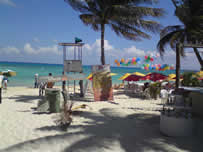Online Diary: TEFL in Playa del Carmen from our 2008 Scholarship winner (5)
Tuesday, 7th April 2009

Georgina Newcombe, winner of the Suzanne Furstner Scholarship 08, reports back on week 4 of her CELTA course in Playa del Carmen.
I’m sitting in the school garden on a Saturday afternoon. There’s a tiny spider scuttling in the keyboard of my laptop, and I’m afraid to press ‘enter’ in case I squash him. Perhaps he’s sheltering from the sun. There isn’t a great deal of wildlife in Playa del Carmen, and what little there is seems strangely dessicated. Even the stray cats have a certain Shake ‘n’ Vac dustiness to their fur. Last night I was tormented by a lone mosquito desperate for a drink; if he hadn’t found my ankle he’d probably have stolen my Coke from the fridge. As we head towards summer, the sun has acquired the kind of radioactive intensity you’d expect from a rogue tanning booth, where hapless women fall asleep and wake up forty minutes later looking like a skinned corpse. I apply five-star factor 30, but it doesn’t work half as well as my friend’s lotion which, at an astonishing factor 70, you would imagine could protect you from pretty much anything, including muggers, sharks and TV License detector vans.
I’ve finally managed to learn a little Spanish. Or at least, to invent my own. There is no Spanish equivalent for the word ‘toe’: rather, it’s called ‘dedo del pie’, which translates, rather delightfully, as ‘finger of the foot.’ Inspired by this, and with the power of innovation, I can now speak a little with the locals through cutting and pasting words according to my own, imbecilic form of Spanglish. Tears become ‘water of the eye.’ An air-conditioning unit is ‘box of air.’ I recently christened ‘snorkel’ as ‘popote grande’, which means large straw, and of which I’m particularly proud. I’ve since been adopted by two Spanish teachers, who like to be amused by my terrible diction much as parents laugh at an infant’s attempts to mount the stairs. At thirty-one years of age, I have the linguistic equivalent of chocolate ice-cream unwittingly smeared all over my face.
The CELTA has now finished and a strange ennui has fallen over the trainees. We feel somehow empty, though we have no idea why. Perhaps, like so many things, the end came too soon, and it will take a while for us to appreciate the relief. The fourth week was tranquil, comprised of a lot of teaching observation but only one lesson to teach, which meant a lot of sitting back and watching someone else do the work. The trick here being to doodle frantically, which gives the appearance of taking notes, when in fact you’re drawing pictures of owls and snowmobiles.
The language school’s El Queso Grande paid a visit on the last day, to talk about how to get work and what kind of lifestyle we could expect as an English Language teacher abroad. His first words to us were: ‘Congratulations, you are now highly employable.’ I was confused by my own pride and relief, feeling less like we had earned a teaching qualification, than we had successfully participated in one of those awful programmes where people have to eat eyeballs or plunge their heads into a tank of eels. He went on to explain the options for working in Mexico – teaching in language colleges, private schools or universities – adding that the only complication was obtaining a work permit. Apparently the Mexican government are as ruthlessly bureaucratic as Haringay Council, and working illegally here is almost as unlawful as fly-tipping or putting your rubbish out at the wrong time, which I believe is punishable by death in some parts of Britain today. But as long as you’re in the system and in the process of being assessed, you can work as much as you like until told otherwise.
Talk soon moved to financial matters. He reminded us we will be earning to fund a lifestyle, not an ISA, so don’t expect to save. The pay varies from country to country, but generally hovers at around £500 a month. This will more than cover accommodation, a few meals at a restaurant, and perhaps an English paper on a Saturday morning. Other than that, just spend whatever you earn and don’t worry about putting pennies in the piggy, because even if you save every peso, dinar or dollar it wouldn’t equate with much back in the UK. One of the few exceptions to this is Japan, where they pay a bit more. But then, we were never in it for the money. Reasons to teach abroad differ from person to person, but it’s usually a heady combination of motivations, of varying degrees of nobility. These include everything from the allure of warmer climes, experiencing different cultures, educating the disadvantaged, and then right back down again to the promise of cheap beer.
The spider has disappeared. He has either escaped from my keyboard when I wasn’t watching, or is at this moment lying wounded under the ‘enter’ key writing a goodbye letter to his parents. On which note, I’ll bid you farewell and thank you for reading about my adventures. If you’re interested in studying for a CELTA, the good people at Cactus will be more than happy to get you on your way. Adios, and good luck!
Tags: tesol, suzanne furstner scholarship, sff2008, celta, course, language, cactus, mexico, tefl, culture, spanish, english
